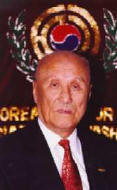
Chung Do Kwan
Founder
GM LEE Won-kuk
04/13/1907 - 02/02/2003
From
The Washington Post Company © 2003
Won Kuk Lee, 95, the
founder and a grandmaster of the Korean martial art of
(Chung Do Kwan) Tae Kwon Do, died of pneumonia Feb. 2
at Arlington Hospital.
Mr. Lee had lived in
Arlington since 1976, and during his years in this
area had given martial arts demonstrations at tae kwon
do, karate and other martial arts studios and schools
in Northern Virginia, suburban Maryland and Washington
and at Howard University.
He was born in what
now is South Korea and graduated from Central
University Law School in Japan. At the time, Korea was
ruled by Japan. In Japan, Mr. Lee studied under the
martial arts master Gichin Funakoshi. Later he studied
other Asian martial arts, including karate in Okinawa
and kung fu in Henan and Shanghai. In 1944, he founded
what became the first tae kwon do school in Korea.
During the period of
the Korean War, Mr. Lee was in Japan, but he returned
to Korea when the war ended.
In the 1960s, one of
Mr. Lee's tae kwon do students was U.S. Army Gen.
William C. Westmoreland, in the period when
Westmoreland was commander of U.S. forces in Vietnam.
Westmoreland later helped him immigrate to the United
States in 1976.
Survivors include
his wife, Moon Chong-Kwi of Arlington; a son, Young
Kil Lee of Arlington; two grandchildren; and one
great-granddaughter.
From the
Modern History of Taekwondo...
Chapter 1: Development of the Korean Kwans
Section 1: Chung Do Kwan
Right after the independence of Korea the Chung Do
Kwan, one of the five key dojangs, was founded first.
It symbolized the Chung Do Kwan's name, Blue Waves,
meaning a youngster's spirit and vitality.
Chung Do Kwan's founder, Lee Won Kuk, moved to Japan
when he was 19 years old, in 1926. While in Japan he
first attended high school and then entered the law
school of Chuo University. Then he joined Japan's
Karate-do headquarters, the Song Do Kwan (Shotokan).
He received Karate instruction from Karate's father,
Funakoshi Sensei. There he learned Karate with the
Song Moo Kwan's founder, Ro Byung Jick.
He moved back to Japan and taught Tang Soo Do in the
Yong Shin school hall in Suh Dae Moon Gu's Ochun Dong,
Seoul because he had a good relationship with Japan's
Chosun Governor General Abe in 1944. This led to the
rumor that he was pro-Japanese.
Later, Oh Do Kwan's founder, Choi Hong Hi said
"After independence Lee Kwan Jang was charged
with acts of pro-Japanese and stood in a special civil
trial."
Lee Won Kuk was a precise person. He had a strong body
of a martial artist and glaringly sharp eyes. His
expression was very strict. Right after the
independence day he seemed to offset his pro-Japanese
deeds by developing a good relationship with people of
the National Police Headquarters. He led the efforts
to get rid of Seoul gangsters. The Chung Do Kwan was
once called the National Police Headquarters dojang.
After the Korean War the Chung Do Kwan members were
less than 200. GM Lee Won Kuk visited the school twice
and watched the lessons. The primary instructors were
Yoo Ung Jun and Son Duk Sung with promotion tests
given every six months.
Graduates of the Chung Do Kwan were: (1) Yoo Ung Jun,
(2) Son Duk Sung, (3) Uhm Woon Kyu, (4) Hyun Jong Myun,
(5) Min Woon Sik, (6) Han In Sook, (7) Jung Young Taek,
(8) Kang Suh Chong, (9) Baek Joon Ki, (10) Nam Tae Hi,
(11) Ko Jae Chun, (12) Kwak Kuen Sik, (13) Kim Suk Kyu,
(14) Han Cha Kyo, (15) Jo Sung Il, (16) Lee Sa Man,
(17) Rhee Jhoon Goo (Jhoon Rhee),
and (18) Kim Bong Sik.
>From Inchon, which became the center of the Chung
Do Kwan's annex Kwans, more schools were opened. They
were: (1) Kang Suh Chong's Kuk Mu Kwan, (2) Lee Yong
Woo's Jung Do Kwan in Suh Dae Moon Ku, (3) Ko Jae
Chun's Chung Ryong Kwan in Kwang Ju and (4) Choi Hong
Hi's Oh Do Kwan. The Oh
Do Kwan especially had active Chung Do Kwan members
who were in the military after the Korean War.
The Chung Do Kwan's first Kwan Jang was Lee Won Kuk,
the second was Son Duk Sung, and the third was Uhm
Woon Kyu. When Son Duk Sung because the Kwan Jang of
the Chung Do Kwan, Uhm Woon Kyu, Hyun Jong Myun, and
Nam Tae Hi had conflicts with regard to the issue of
who should receive the
nomination from Lee Won Kuk and become the next Kwan
Jang. |